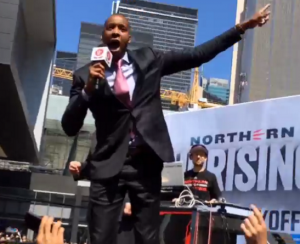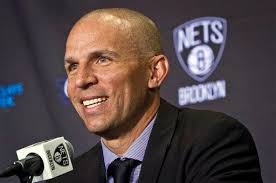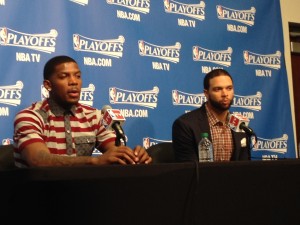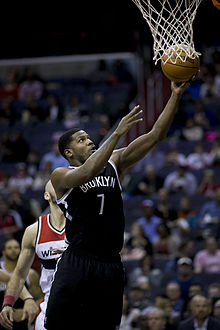 Masai Ujiri made his first trip to Brooklyn since his infamous remarks about the borough before Game 1 at a fan rally in Toronto.
Masai Ujiri made his first trip to Brooklyn since his infamous remarks about the borough before Game 1 at a fan rally in Toronto.
“F*ck Brooklyn,” Ujiri said. (Some of you might not have known exactly what Ujiri said. Now you know.)
Sitting courtside at Barclays Center before Game 3, Ujiri spoke with SheridanHoops about the incident and the hostile environment the Raptors would face in Brooklyn going forward.
“It wasn’t about Brooklyn, honestly,” Ujiri told SheridanHoops. “I apologized to Brooklyn, I apologized to the team and it wasn’t about the borough or anything. For me, it’s competing, you know? I tried to get our fans, our following and us believing in ourselves.”
“Every playoff environment is going to be hostile, is going to be tough to play in,” Ujiri added. “If we’re going to grow as a team, we need to play in this kind of situation.”
Toronto’s young and inexperienced core failed its first playoff test on the road, falling to the Nets 102-98 at Barclays Center on Friday night.
When leading 2-1, the Nets have won six consecutive playoff series and are 7-1 all-time in such situations.
Fans at the arena were predominantly respectful during the game, chanting “USA” and “Brooklyn.”
Beforehand, Jason Kidd said Ujiri’s comments weren’t bulletin board material.
 “As coaches or players, we just focus on the game,” Kidd said. “That’s between the fans and the media to have a story or talk about. But for the players, it’s about basketball and being able to execute on both ends offensively and defensively.”
“As coaches or players, we just focus on the game,” Kidd said. “That’s between the fans and the media to have a story or talk about. But for the players, it’s about basketball and being able to execute on both ends offensively and defensively.”
While speculation of Brooklyn’s angst towards Ujiri prior to Game 3 was overhyped in retrospect, the keys to Brooklyn’s success against Toronto remain the same – a heavy dosage of Joe Johnson posting up on the wing and Deron Williams’ return to “D-Will” form.
“Those two are playing extremely well, they’re very aggressive,” Kidd said. “Joe is causing a lot of problems. They’re looking to double-team and trap him when he has the ball and his teammates are stepping up. Deron is one of those guys.”
Through the first three games of the series, Johnson is averaging 23.7 points per game while shooting the leather off the basketball from the field (.605) and perfectly from the foul line (16-16). Williams has averaged 20.3 points per game.
In the two victories, both have stepped up their games. Johnson is averaging 26.5 points per game while shooting an even higher percentage (.633) from the field. Williams is averaging 23 points per game while shooting a respectable percentage from the field (.441).
This is the type of impact Billy King envisioned when he originally paired the two guards.
“This is a great day, because we’ve put together what I call the best backcourt in the NBA,” King said. “There are a lot of good backcourts, but I don’t think there are many where you’ve got two guys that can get 18-20 points every night and defend their positions.”
 It has taken two years for Johnson and Williams to peak in terms of their chemistry together, a process that has been an adjustment.
It has taken two years for Johnson and Williams to peak in terms of their chemistry together, a process that has been an adjustment.
“I think we had to learn to play with each other,” Williams said. “We’re two guys that, I’m not saying we dominated the ball, but we had the ball in our hands a lot and we’ve had to learn to share the ball and also learn where each other is going to be. I think we have a great understanding of that right now. When Joe’s playing in the post, I know when the double-team is coming, where I have to be.”
Dwane Casey acknowledged Toronto’s struggles guarding Brooklyn’s cohesive backcourt.
“One-on-one, that’s the difference,” Casey said. We’ve got to do a better job of getting the help there quicker and when we do get it there, we’re in pretty good shape in those situations. We’ve got to make sure we recognize where they are on the floor. They’re two great one-on-one players and there’s no one on our team that’s going to guard them by themselves, so we’ve got to make sure we get help there.”
Raptors All-Star DeMar DeRozan has been one of Toronto’s players with the unenviable task of trying to guard Johnson at times on the wing and in the post.
 “He’s a big body,” DeRozan said. “It’s tough once he gets you down there and get his hip on you. He’s very crafty with the ball and his floater. You really can’t give him too much to do it once he gets six or seven feet in there. We’ve just got to be quicker on the double teams.”
“He’s a big body,” DeRozan said. “It’s tough once he gets you down there and get his hip on you. He’s very crafty with the ball and his floater. You really can’t give him too much to do it once he gets six or seven feet in there. We’ve just got to be quicker on the double teams.”
Johnson has scored at will on the block without a double-team by using a fadeaway jumper, a floater extending to the foul line and a crossover dribble that has left Toronto defenders in the dust when operating just inside the arc.
After Game 3, I asked Johnson why he’s been so successful posting up against Toronto.
“I was just being patient,” Johnson replied. “Throughout the first half, I saw them coming at me with double-teams so I was just trying to make the right play for my teammates and we were rolling early. In the second half, it opened up and I got a couple of easy looks.”
The right play for Johnson and the Nets has been to swing the ball around the perimeter ultimately finding Williams or Paul Pierce for open looks at the rim.
When Johnson and Williams are clicking, so are the Nets.
“We need that, we need that from (Deron) and Joe constantly,” Pierce said. “When these guys are getting into the paint, making plays, scoring, getting to the free throw line, we’re a better team.”
In a series that has been separated by one point over seven total games (regular season included) between Brooklyn and Toronto, with the Raptors having outscored the Nets 678-677, every basket from Johnson and Williams is crucial to winning the series and advancing to the next round.
Michael Scotto is an NBA columnist for SheridanHoops.com. You can follow him on Twitter.